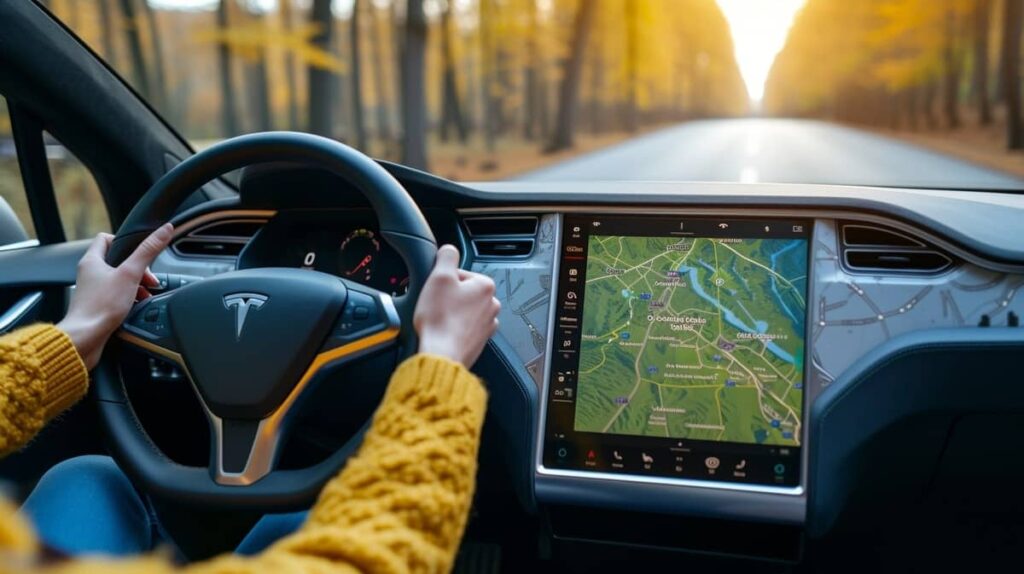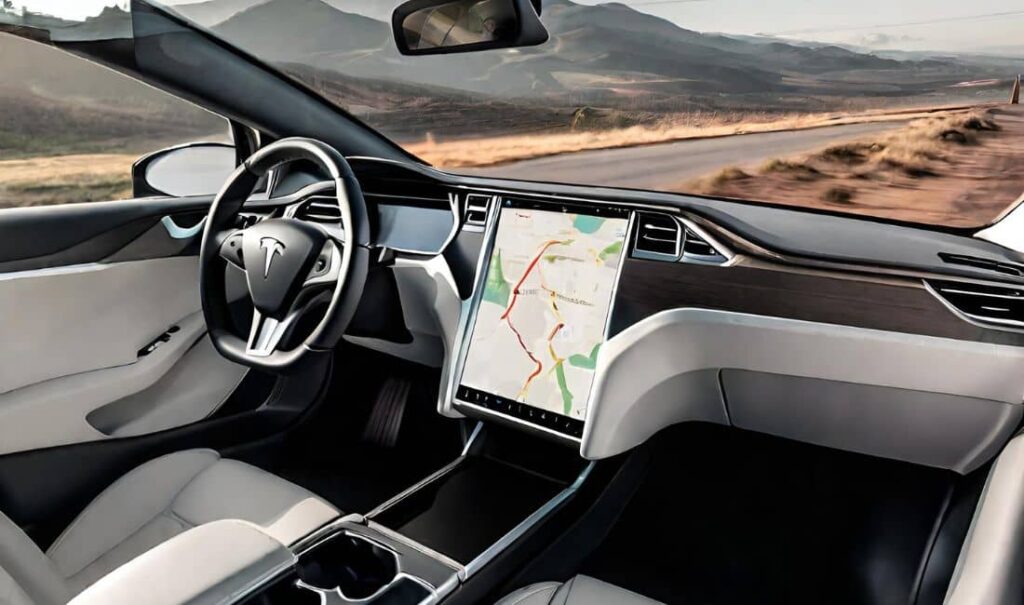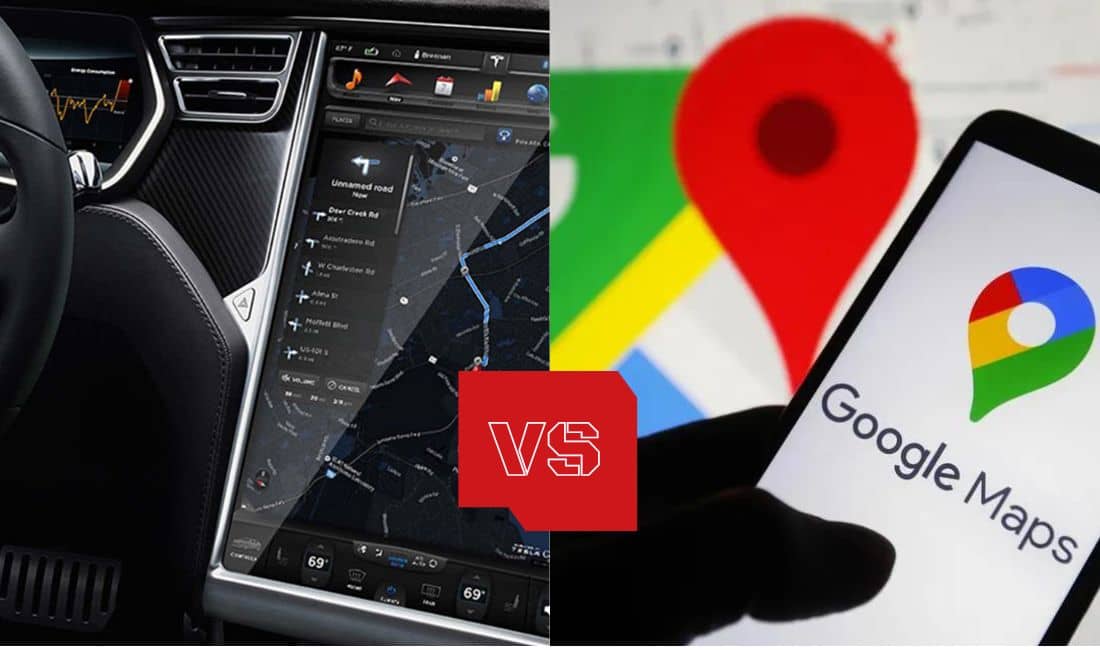Navigating unfamiliar areas in your Tesla can be challenging. So, this is where Tesla Navigation and Google Maps come in to help you find the best route to your destination.
But how do Tesla Navigation and Google Maps compare? These two navigation systems differ in various ways, including how they provide charging locations. In addition, they vary in terms of features such as autopilot and auto navigation. Other differences include cost and integration.
What about similarities? In this article, we will answer all the questions you might have about Tesla Navigation versus Google Maps.
Tesla Navigation Vs. Google Maps: Quick Comparison Table
Check out this quick guide of how the Tesla navigation compares to Google Maps.
| Features | Tesla Navigation | Google Maps |
| Locating Charging Stations | Finds the locations automatically | Requires a manual search |
| Integration | Built-in feature | Third-party application |
| Autopilot Functionality | Available | Not available |
| Auto Navigation | Available | Unavailable |
| Cost | Free for 8 years and $9.99 per month or $99 per year | Free for life |
Tesla Navigation Vs. Google Maps: Differences In Detail

Tesla Navigation and Google Maps offer up-to-date navigation, allowing you to get to your destination with minimal hassle. However, these two systems are different in many ways, including the following:
1. Finding Charging Locations
Tesla Navigation is programmed to automatically find charging stations and destination chargers when driving long distances. Therefore, you don’t have to manually search for the stations. If you’re experiencing issues with your Tesla navigation system, don’t worry! Explore our helpful guide on, fixing Tesla navigation not working. We’ve got effective solutions to get you back on track.
Simply, the system builds supercharging stops into your trip, along with how long your Tesla will take to charge. And if the original charging point is at capacity, the system will reroute you based on how much charge you have.
With Google Maps, you must manually search for EV-charging stations while planning your trip. While doing so, you must specify the plug type your Tesla uses. Then, you will get suggestions of the best stops based on current traffic so you can add them to your navigation route.
2. Integration
Unlike Google Maps, Tesla Navigation is integrated into the car’s central display. Simply put, the system comes as a standard feature built to work with your Tesla’s hardware and software.
On the other hand, Google Maps is a separate or a third-party application. Therefore, you can only use it on your Tesla’s touchscreen via a smartphone. To integrate the maps with Tesla, follow these steps:
Here is a video of how to use Google Maps in Tesla:
3. Autopilot Functionality
Autopilot is a feature integrated with the Tesla Navigation system. It guides your vehicle through highway driving by maintaining your speed and distance from the leading car.
In addition, it enables auto-lane change, auto-park and slows down or stops your car if there are traffic lights or stop signs. This helps make driving safer and less demanding.
Unfortunately, you cannot use the autopilot functionality with Google Maps. This is because Google Maps is a third-party navigation application that uses its own mapping data.
4. Auto Navigation
With Tesla Navigation, you can always enable the ‘automatic navigation’ option. As a result, your car will automatically navigate to a destination it anticipates you would like to go. It does this by considering your calendar entries, frequently traveled routes, and time of the day.
Like the autopilot functionality, the auto navigation feature does not work with Google Maps. This is because it is built to rely on Tesla Navigation’s own data sources.
5. Cost
The Tesla Navigation system is included in the Standard Connectivity package as a free feature. However, it is only free for 8 years and only includes basic navigation features.
After 8 years, the Navigation system is usually available as a subscription service. In this case, you can pay $9.99 per month or $99 per year.
Conversely, you can use Google Maps for free throughout your Tesla’s lifetime to access basic features like getting directions. However, you must pay for cellular data because the Maps use Wi-Fi hotspots.
What Are The Similarities?
As it turns out, the Tesla Navigation and Google Maps differences are as many as their similarities. Check them out.
1. Real-time Traffic Data
Both Tesla Navigation and Google Maps are built to detect real-time traffic conditions. This enables these applications to automatically modify estimated driving and arrival times.
2. Supports Voice Commands
When navigating to a location, you can enter your destination manually from your phone or Tesla touchscreen. Alternatively, you can speak a voice command. You simply speak a landmark, address, or business, and the system will find it.
3. Updates
Both navigation applications usually receive regular updates to help enhance their functionality and accuracy. With Tesla Navigation, the software updates vary based on your location and car model.
You can initiate the Tesla Navigation updates on your Tesla mobile application. However, Google Maps updates are universal and available in app stores.
4. Route Planning
Tesla Navigation and Google Maps both have route-planning capabilities. The services allow you to plan a route for many locations.
While planning, Tesla Navigation usually considers the car’s range, current battery charge, and charging spot speeds. This allows you to choose the most efficient route. On the other hand, Google Maps considers traffic conditions to create a multi-stop route.
5. Alternate Routes
After choosing your preferred destination, Tesla Navigation and Google Maps typically display alternate routes. This enables you to compare the total travel time for each journey. Both services provide up to 3 substitute routes, if available.
Is Tesla Navigation Better Than Google Maps?

Yes, especially when it comes to convenience. This is because it comes built into the car, unlike Google Maps. In addition, Tesla Navigation allows you to use the autopilot and auto navigation features for an enhanced driving experience.
The only major downside with Tesla Navigation is the cost. That said, both navigation systems are excellent in the case of providing accurate and up-to-date data.
FAQs
In this section, we will respond to commonly asked queries regarding the Tesla Navigation system vs Google Maps.
Yes. Besides warning you about traffic jams, both navigation systems automatically reroute you to avoid ferries and tolls if possible. You just need to choose these options.
No. The Tesla Navigation system is built specifically for Tesla cars. On the other hand, Google Maps’ interface is designed to work with different vehicle makes and models.
Both services take several factors into account to provide the most accurate routes. These include weather forecasts, traffic conditions, speed limits, and road closures.
Final Thoughts
If you own a Tesla, Google Maps and Tesla Navigation are the most reliable navigation systems. The applications provide up-to-date mapping routes and directions, allowing you to navigate effortlessly from one place to another.
Despite their many similarities, these two systems differ in several ways, especially regarding features. With that said, if you have to choose between the two, we highly recommend the Tesla Navigation. It is more convenient and user-friendly.

I am an experienced guide in electric mobility, offering clear and expert guidance for those venturing into the world of electric vehicles.
Through collaborations, research, and hands-on experience, I navigate readers through the evolving landscape of smart automobile technologies and the significance of renewables.

